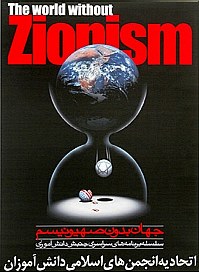What follows is an essay by a commenter on Gates of Vienna named Kierkegaard. He submitted it originally in a somewhat different form. After several exchanges, perhaps this final collaboration will serve to convey the meaning he intended. If it does not he is, of course, free to excoriate this editor in the comments. At any rate, it grows late and Hallowe’en will soon be over so this has to be posted in its present state.

Tonight marks the culmination of the celebration of Ramadan in the ‘Night of Power’, the holiest night of the year in the Muslim calendar. It also happens to fall on the same night as Hallowe’en. For Muslims, it is a sacred commemoration of the moment when Allah first spoke to the Prophet Muhammed. For Westerners, secular and Christian alike, it is ‘All Hallows’ (or Sainted Souls’) Eve’, when the dead walked the earth, before all the Saints rose to rout them with the dawn. This, of course, was originally a pagan autumnal festival, called ‘Samhain’ in Celtic tradition, long since co-opted by the Christian Church–just as Ramadan has its roots in a similar neolithic past.
If there actually are any traditional, old-fashioned Christians with a sense of history still practicing today, what significance might they attach to this confluence of holidays?
Let us consider for a moment the humble church-tower bell, so beloved by Lord Peter Wimsey in The Nine Tailors. In the Tolkien-like village life of our ancestors these bells served as a warning siren, a time-piece, a reassurance that all was well in the world, and a reminder to pray. To fear or flee the bells was in itself considered a sure sign of possession by a demon. Bell-ringing began as a church-approved technique of driving evil spirits away — human voices, raised in song, were considered insufficiently noisy for the task.
And that brings us to the recent attacks on Christian Coptic churches in Egypt. The mobs with their rocks were following the ancient Muslim tradition which hatred of church bells.
The origins of Islam are enshrouded, to some degree, in a mystery enforced by Islam itself. Over the centuries, the version of the sacred texts or ‘suras’ on which the Quran is based has become limited, in the Sunni world, to a paltry few based on the work of ‘approved’ scribes. This approval has come about, not through scholarship or debate, but rather through violent enforcement (the codification of the Christian New Testament was not a process of polite disagreement either. However, it has some been centuries since any scholar — i.e., “heretic” — was murdered by the state or the Church for debating, analyzing or studying the Gospels).
Muslims believe that their prophet Muhammed received their sacred texts (suras) directly from God. Or rather, they believe that Allah received them, whole and intact, through the agency of the Archangel Gabriel. Armed with the sacred word, Mohammed then set out to convert the polytheistic tribesmen of the desert, later bringing his received truth to cities such as Mecca and Medina, where some received it gratefully and others, as the result of their ‘apostasy’, had to be put to the sword.
The historical problems with this sequence of events, of course, are manifold, and explains in part why the Saudi government immediately bulldozes over any new archaeological sites discovered in those cities. Here are some of the obstacles history places in front of present-day Muslims:
Problem One: Allah (the Hebrew ‘El’) was the chief god of this pagan pantheon, not a monotheistic new-comer (neither was Yahweh to the Jews).
Problem Two: many of the citizens of the areas conquered by Muhammed were not pagans, but were either Jewish or Greek Orthodox Christians.
Problem Three: to become an apostate, there must first exist a religion that can be betrayed and Islam is by far the youngest of the world’s ‘major’ religions.
Problem Four: recent scholarship in Germany suggests that some of these original suras of Islam, far from ‘bypassing’ versions of ‘pro-Semitic’ myth (as for example in the Muslim version of Genesis), were in fact taken from Syriac Christian scripture. Islam has a way of obliterating other histories. Thus, long buried is the fact that Islam’s first invasion of the Byzantine Christian world did not receive a warm welcome. Mohammed’s received religion was viewed by the Church not merely as a fresh heresy akin to the Manicheans, Arians, or Pelagians. Instead, Islam was viewed as something altogether new and more alarming: a heresy qualitatively worse than those arising out of internecine Christian conflict. Thus, Islam must have been inspired directly by Satan.
This possession of Islam (the literal meaning of which, in Arabic, is ‘submission’) by an evil entity could be plainly seen, Christians thought, in the public behavior of Muslims, such as,
· the rituals of sanctified slaughter (particularly the public sacrifice of goats),
· the strange physical prostrations Muslims used during prayer,
· Muslim intolerance of beloved saints and higher divinities such as Christ,
· and the violent desecration of churches and synagogues.
The very name of Islam’s founder, Muhammed, Mahound, or ‘Mahomet’, was transformed syncretically by Christians into the name for the major demon, Baphomet. Through this transformation, Christians thus believed the Muslims worshipped a demon.
Later on, this perception of Islam would be important when evidence of Baphomet’s worship was a major charge in the persecution of the Order of the Knights Templar by the Pope and King Philip of France. The Knights Templar (Knights of the Temple of Solomon) alone among the Crusaders had conducted scholarly studies and performed what would be seen today as cultural exchanges with Islam.
Through these exchanges an alliance sprang up between the Templars and the Shiite Ismalien sect of Islam called the “Assassins’ (because of their addiction to hashish; it was they who invented the suicide assassin ‘martyr’). The Assassins were headquartered in the Bekaa Valley of Lebanon and also had a base at the castle of Al-Alamut in northern Iran (Marco Polo witnessed the later destruction of the castle –The Eagle’s Lair — by the invading Mongols in the 13th Century; he wrote a detailed description of the sect in his ‘Travels’.).
During the early 1200’s this alliance between the Templars and Assassins helped to maintain stability in the Crusader kingdoms until the fall of Acre (Biblical Akko). After that the Templars’ usefulness to the West was ended and this alliance with Muslims was used against them.
The Ismaliens, however, continued as a geopolitical force long after the Mongols had attempted to exterminate them. Their modern titular leader, the Aga Khan, continues to derive his title and a portion of his wealth from the sect even today from his ancestral home in Pakistan. Now the Iranian Shiite descendants of the Assassin Order still command by proxy the assassinations of Western and Israeli soldiers and civilians across the Middle East exactly as they did nearly a thousand years ago, using much the same combination of drugs and money to train their emissaries. They have a different name in the West now–they are called ‘suicide bombers’.
By and large, these profound historical continuities are resolutely ignored in our society, even on the occasions that they are recalled and discussed. Many theologians, especially those within the Anglican Church, have come to reject the physical existence of Satan. Interestingly, they do respect the belief in Satan that is inherent in Islam. This, my- condescending-respect-for-your-belief, is after all, tolerant, Anglican multicultural diversity.
Many modern Westerners, in fact, accept as their gospel the idea that “the Great Satan” is indeed the West and its cultural horrors. In this convoluted self-hatred mainstream American churches merely reflect the views of their ever-shrinking liberal constituencies. Thus, when the mullahs who rule Iran hold ‘terrorist conventions’ complete with ‘martyrdom booths’, or ‘Death to Zionism’ conferences, or even export the publications published for them to the Frankfurt Book Fair few voices are raised in protest within Western religious ranks.
The use of the term Satan (more properly ‘Shaitan’) in Islamic theology continues to be misunderstood in the West, despite its “respect” for Muslim belief. For Islam, the name, Satan, does not refer to an actual entity but is a concept embracing all evil. The Shaitan in the Muslim version of Genesis is specifically named ‘Iblis’ and is an ‘ifrit’ (‘afreet’) or demon. This term, Shaitan, seems to have evolved from a word meaning ‘astray’ or ‘misled.’ Eventually, this idea came to be the metaphorical interpretation of Satan’s primary role in the Christian Bible as well. So when the President of Iran names the United States as the “Great Satan” he does not mean to say we are literally the body of Iblis. Instead, he is calling us the chief source of evil in the word.
Salman Rushdie’s conflict with the mullahs illustrates this point. In his novel The Satanic Verses, Rushdie dared to suggest allegorically that perhaps parts of the Quran were “misled,” inspired alternately by a ‘good’ angel and an ‘evil’ one. Such “literary criticism” of the Holy Book, which may never be altered or mocked even allegorically, is an automatic death sentence for whomever utters it. Rushdie’s heresy led even the Sunni Egyptian Nobel prize-winner Naghib Mahfouz to back the murderous ‘fatwa’ pronounced against Rushdie by Ayatollah Khomeini. As V. S. Naipaul observed, the Iranians were merely exercising literary criticism of their own. Naipaul and Mahfouz are sophisticated, Western-educated writers who represent the face of ‘moderate Islam’, yet this is how they speak and think on this single, inflammably irrational subject.
A further irony is that Rushdie was merely echoing the Greek New Testament chapters in which a voice whispered temptations to Jesus, as he wandered during his fast in the desert. Jesus rejected this voice out of hand, recognizing it as that of the Devil. Small wonder then, that in the view of Christian theologians for nearly a millennium, when this same experience befell Mohammed (as it did so many Christian saints), he did not order the voice to depart. Instead he heeded it, and proclaimed that what he heard was the voice of God speaking through an angel. Once Christianity understood the origins of the Koran, Papal Bulls were explicit on this matter: Mohammed was mistaken about the source of the voice he heard in the cave. Much later, Jeanne d’Arc was to burn at the stake for following her voices.
So where do things stand now? Is it that the West, and Christianity on which it was founded, has been the one to change while Islam has remained exactly the same? Is this the root of the “clash of civilizations”?
Obviously, Christianity has changed, but so has Islam; over the centuries it has fractured, divided, and adapted to the various cultures where it has taken root. What has not changed is the Koran and the fundamentalist tenets of its followers. Thus, even “moderate” Islam becomes baffled and contemptuous for what it sees as the West’s lack of belief, and particularly our treasonous rejection of our heritage.
Thus, Islam continues to encroach simply because it can: since we appear to them to have neither pride nor hatred to fall back on, they can continue to push us back. It seems to be working, doesn’t it?
Cultures, like human beings, have their demons. Islam has repeatedly revealed its demons to us while we continue in a state of denial: demons? Us? Beneath the West’s sanitized tolerance and sophistication lies a terrible reluctance; we are afraid to even admit our demonic side, much less to confront it.
In recent years, what passes for theological debate between Islam and Christianity evidences a one-sided respect. Is this because where there is not fear there is also no respect?
The West long ago ceased viewing Satan in an immediate and anthropomorphic way. While this is a tribute to our sophistication and modernity, such a perspective fails to impress those for whom Evil remains a palpable presence. It has been reported on Al-Jazeera that Saddam Hussein himself is a longtime Satanist and wears an amulet to prove his loyalty. And the voice at the ears of Bin Laden, Zarqawi, and Ahmadinejad, whispering exhortations to kill and kill again? No, that is not God.
These are terrible, cynical people who exist in a world straddling a brutal past and a nihilistic future; they are equally at home in the symbolism of both. Our hubris and our ignorance allows us to imagine that we can talk such men out of creating and using nuclear (or any other) weapons. They see talk itself as weakness and continue their pursuit of nuclear technology so that they can manipulate the doctrines of their religion and ‘eradicate evil’ for their own personal gain. “Eradicate,” as the President of Iran just proclaimed again, not just Israel, not just the United States, but “the whole evil Anglo-Saxon devil.”
The Shaitan.
Us.
This Halloween we might do well to ponder what we really know about those who plan to destroy us. We would be wiser if we understood what inspires their ambitions.
It is also the right time — a good and proper time — to examine our own demons, to uncover them and to name them. In this the ancient Church was correct: the first step in conquering evil is to name it.

To read further about the Crusades go here. This is an online edition of the most definitive works ever published on the Crusades.
For more information on the Assassins, go here.
Information on Iranian anti-Semitism at the Frankfurt Fair.





 Dr. Zin at
Dr. Zin at  While [Prime Minister Manmohan Singh] did not say who was suspected in the explosions, the Indian government faces opposition from dozens of militant organizations, from tiny fringe groups to well-armed Kashmiri insurgents who have previously attacked New Delhi, including a bloody 2001 assault on parliament. Some of those groups fiercely oppose the India-Pakistan peace process, which began early last year.
While [Prime Minister Manmohan Singh] did not say who was suspected in the explosions, the Indian government faces opposition from dozens of militant organizations, from tiny fringe groups to well-armed Kashmiri insurgents who have previously attacked New Delhi, including a bloody 2001 assault on parliament. Some of those groups fiercely oppose the India-Pakistan peace process, which began early last year. Damas de Blanco, the Ladies in White, have won the Sakharov Prize for Freedom of Thought for 2005.
Damas de Blanco, the Ladies in White, have won the Sakharov Prize for Freedom of Thought for 2005.